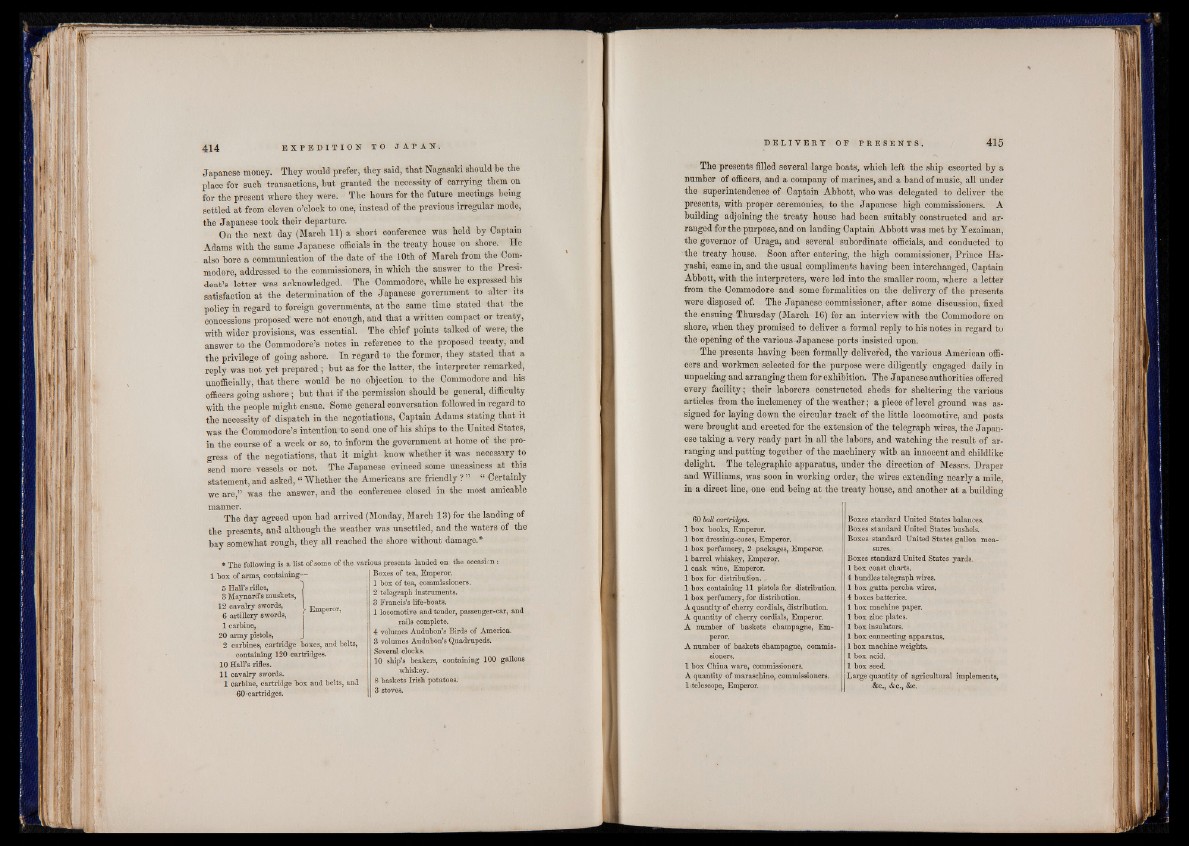
Japanese money. They would prefer, they said, that Nagasaki should he the
place for such transactions, hut granted the necessity of carrying them on
for the present where they were. The houre for the future meetings heing
settled at from eleven o’clock to one, instead of the previous irregular mode,
the Japanese took their departure.
On the next day (March 11) a short conference was held hy Captain
Adams with the same Japanese officials in the treaty house on shore. He
also hore a communication of the date of the 10th of March from the Commodore,
addressed to the commissioners, in which the answer to the President’s
letter was acknowledged. The Commodore, while he expressed his
satisfaction at the determination of the Japanese government to alter its
policy in regard to foreign governments, at the same time stated that the
concessions proposed were not enough, and that a written compact or treaty,
with wider provisions, was essential. The chief points talked of were, the
answer to the Commodore’s notes in reference to the proposed treaty, and
the privilege of going ashore. In regard to the former, they stated that a
reply was not yet prepared; hut as for the latter, the interpreter remarked,
unofficially, that there would he no objection to the Commodore and his
officers going ashore; hut that if the permission should be general, difficulty
with the people might ensue. Some general conversation followed in regard to
the necessity of dispatch in the negotiations, Captain Adams stating that it
was the Commodore’s intention to send one of his ships to the United States,
in the course of a week or so, to inform the government at home of the progress
of the negotiations, that it might know whether it was necessary to
send more vessels or not. The Japanese evinced some uneasiness at this
statement, and asked, “ Whether the Americans are friendly ? ” “ Certainly
we are,” was the answer, and the conference closed in the most amicable
manner.
The day agreed upon had arrived (Monday, March 13) for the landing of
the presents, and although the weather was unsettled, and the waters of the
bay somewhat rough, they all reached the shore without damage.*
* The following is a list of some of the various presents landed on the occasion :
Emperor,
1 box of arms, containing—
5 Hall’s rifles, 1
3 Maynard’s muskets,
12 cavalry swords,
6 artillery swords,
1 carhine,
20 army pistols,
2 carbines, cartridge boxes, and belts,
containing 120 cartridges.
10 Hall’s rifles.
11 cavalry swords.
1 carhine, cartridge ~box and belts, and
flO ^cartridges.
Boxes of tea, Emperor.
1 box of tea, commissioners.
2 telegraph instruments.
3 Francis’s life-boats.
1 locomotive and tender, passenger-car, and
rails complete.
4 volumes Audubon’s Birds of America.
3 volumes Audubon’s Quadrupeds.
Several clocks.
10 ship’s beakers, containing 100 gallons
whiskey.
8 baskets Irish potatoes.'
3 stoves.
The presents filled several large boats, which left the ship escorted by a
number of officers, and a company of marines, and a band of music, all under
the superintendence of Captain Abbott, who was delegated to deliver the
presents, with proper ceremonies, to the Japanese high commissioners. A
building adjoining the treaty house had been suitably constructed and arranged
for the purpose, and on landing Captain Abbott was met by Yezaiman,
the governor of Uraga, and several subordinate officials, and conducted to
the treaty house. Soon after entering, the high commissioner, Prince Ha-
yashi, came in, and the usual compliments having been interchanged, Captain
Abbott, with the interpreters, were led into the smaller room, where a letter
from the Commodore and some formalities on the delivery of the presents
were disposed of. The J apanese commissioner, after some discussion, fixed
the ensuing Thursday (March 16) for an interview with the Commodore on
shore, when they promised to deliver a formal reply to his notes in regard to
the opening of the various Japanese ports insisted upon.
The presents having been formally delivered, the various American officers
and workmen selected for the purpose were diligently engaged daily in
unpacking and arranging them for exhibition. The Japanese authorities offered
every facility; their laborers constructed sheds for sheltering the various
articles from the inclemency of the weather; a piece of level ground was assigned
for laying down the circular track of the little locomotive, and posts
were brought and erected for the extension of the telegraph wires, the Japanese
taking a very ready part in all the labors, and watching the result of arranging
and putting together of the machinery with an innocent and childlike
delight. The telegraphic apparatus, under the direction of Messrs. Draper
and Williams, was soon in working order, the wires extending nearly a mile,
in a direct line, one end being at the treaty house, and another at a building
60 boll cartridges.
1 box books, Emperor.
1 box dressing-cases, Emperor.
1 box perfumery, 2 packages, Emperor.
1 barrel whiskey, Emperor.
1 cask wine, Emperor.
1 box for distribution.
1 box containing 11 pistols for distribution.
1 box perfumery, for distribution.
A quantity of cherry cordials, distribution.
A quantity of cherry cordials, Emperor.
A number of baskets champagne, Emperor.
A number of baskets champagne, commissioners.
1 box China ware, commissioners.
A quantity of maraschino, commissioners.
1'„telescope, Emperor.
Boxes standard United States balances.
Boxes standard United States bushels.
Boxes standard United States gallon measures.
Boxes standard United States yards.
1 box coast charts.
4 bundles telegraph wires.
1 box gutta percha wires.
4 boxes batteries.
1 box machine paper.
1 box zinc plates.
1 box insulators.
1 box connecting apparatus.
1 box machine weights.
1 box acid.
1 box seed.
Large quantity of agricultural implements,
&c., &c., &c.